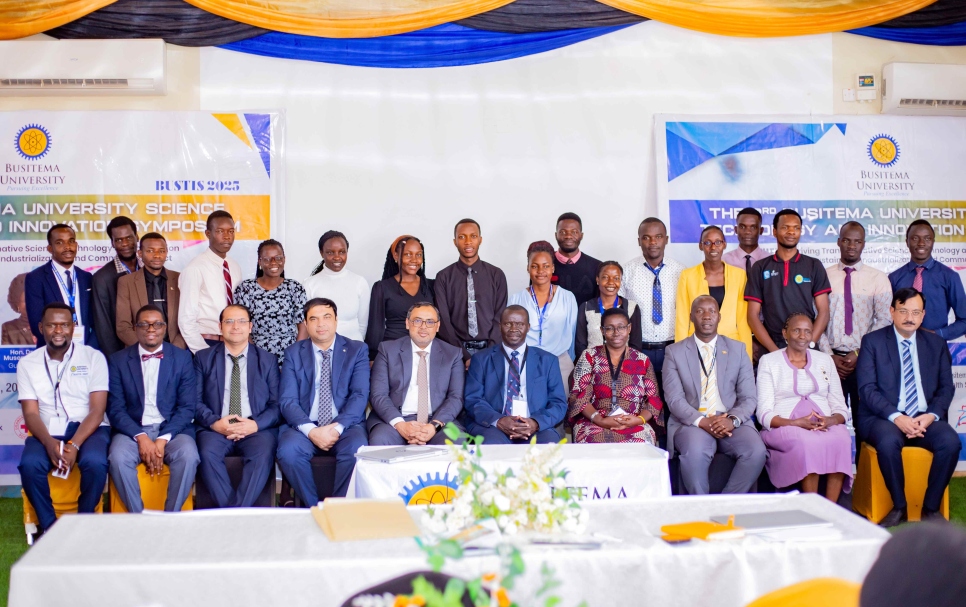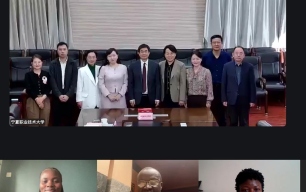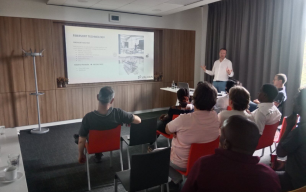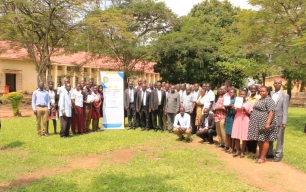Science Must Power Uganda’s Transformation, Says Minister Musenero at Busitema STI Symposium

A surge of optimism swept through Busitema University’s Faculty of Health Sciences in Mbale as scientists, innovators, and policy makers from across Africa and beyond gathered for the 3rd Busitema University Science, Technology and Innovation Symposium.
The three-day event, held from October 14th to 16th, 2025, brought together local and international delegates to reflect on how science and technology can drive industrialization and community transformation. The symposium, organized by the Directorate of Graduate Studies, Research and Innovation, ran under the theme “Driving Transformative Science, Technology and Innovation for Sustainable Industrialization and Community Impact.”
Opening the event, Prof. Paul Waako, the Vice Chancellor, welcomed keynote speakers and delegates from Pakistan, Kenya, and across East Africa. He noted that the symposium had become a defining part of Busitema’s calendar a space where ideas meet opportunity.
“We are now emphasizing innovation and product development as a fourth core mission, alongside teaching, research, and community outreach,” Prof. Waako said. “This focus will help us contribute directly to Uganda’s socio-economic transformation and the country’s Vision 2040 growth strategy.”
The Vice Chancellor commended the sponsors and partners who continue to support the university’s growing role as a hub for applied research and technology-driven entrepreneurship.
In his welcome remarks, Prof. Dan Kibuule, Dean of the Faculty of Health Sciences, described the symposium as an “ideal platform for scientific exchange” that bridges disciplines and accelerates knowledge transfer. He emphasized that the event aligns with Uganda’s National Development Plan IV, Vision 2040, Africa’s Agenda 2063, and the Sustainable Development Goals. “This is where science meets society,” he said. “It’s an opportunity to share cutting-edge research, explore emerging technologies, and turn innovation into impact.”
Assoc echoed that message. Prof. Samson Rwahwire, Director of Graduate Studies, Research and Innovation, who underscored the university’s commitment to transforming research into tangible outcomes. “This gathering reflects our belief that knowledge must lead to solutions,” Rwahwire remarked. “Busitema University stands among Uganda’s top four institutions in research excellence, and we take pride in ensuring our discoveries serve real community needs.”

Associate Professor Rwahwire delivers remarks to delegates during the meeting
He further highlighted the university’s focus on strategic areas aligned with Africa’s Agenda 2063, Uganda’s Vision 2040, and the forthcoming National Development Plan. These priorities include the ATM framework Agro-processing, Tourism, and Minerals (including Oil and Gas) as well as Science, Technology, and Innovation (STI).
The symposium featured thought-provoking keynote addresses from Dr. Yasin Nawab, Vice Chancellor of the University of Kamalia in Pakistan, and Prof. Josephat I. Mwasiagi of Moi University, Kenya. Both scholars spoke about the transformative power of technology in advancing sustainable industries, urging African institutions to invest in innovation ecosystems that link academia with enterprise.

Professor Mwasiagi delivers a keynote speech to delegates.
Their perspectives, blending global experience with regional priorities, resonated deeply with the participants, reinforcing Busitema’s growing reputation as an emerging leader in applied research.
Delivering the keynote message as Chief Guest, Hon. Dr. Monica Musenero, Minister for Science, Technology and Innovation in the Office of the President, called on universities to move beyond research for its own sake and focus on translating knowledge into practical innovations that uplift communities. “Knowledge must become tools, and tools must become innovations,” she told the audience. “That is how we progress our economy.”
Dr. Musenero commended Busitema University for taking a front-line role in transforming Uganda’s education system into a foundation for industrial and technological growth. She pointed to emerging innovations in banana textiles, artificial intelligence integration, and agro-industrial value addition as powerful examples of research with economic impact.
“I am impressed by the creativity here from turning banana waste into textile fibers to embedding AI in research,” she said. “These are the seeds of an industrial future.”
The Minister also announced government plans to collaborate with Busitema University in establishing an Agro-Science Park at the Faculty of Agriculture and Animal Sciences, aimed at turning agricultural research into commercial enterprises.
She noted that the government’s broader agenda includes building capacity for value addition in key crops such as coffee, sweet potato, and banana. She highlighted the establishment of a Pathogen Economy Hub in Nakasongola to boost local vaccine production.
“We are creating an enabling environment where scientists can refine, incubate, and scale their innovations,” she said. “Busitema is at the heart of this transformation.”
Throughout the symposium, participants discussed the need for stronger linkages between universities, industry, and government. Presenters showcased innovative projects in health sciences, renewable energy, agribusiness, and digital technology all aimed at fostering sustainable livelihoods and industrial growth.
As discussions drew to a close, one message rang clear: Uganda’s future depends on how well it harnesses science and innovation to solve pressing challenges. The Minister’s words “Science must power Uganda’s transformation” became both a rallying cry and a call to action for Busitema University and its partners.
The 3rd Busitema University Science, Technology and Innovation Symposium ended not merely as a conference of ideas, but as a renewed commitment to turn research into reality knowledge into enterprise, and innovation into impact
- 43 views




